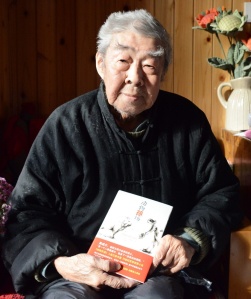By Michael Rank
UPDATE – Some sad news: Sun Zhongxu, a prolific translator of Orwell and other 20th century authors, has committed suicide at the age of 41. For further information, see below.
UPDATE 2 – The Taiwan-based journal Concentric recently published a special issue entitled Orienting Orwell: Asian and Global Perspectives on George Orwell. It includes two articles of direct relevance to this one: “‘Asia, Your Asia’: Reflections of Orwell and Asia” by Henk Vynckier and “The Reception of George Orwell in Taiwan” by Te-hsing Shan. I plan to discuss these articles at a later date.
UPDATE 3 – Prof Jeff Wasserstrom of University of California, Irvine discusses Orwell and Huxley in contemporary China in a 16-minute video presentation.
UPDATE 4 – In an article in the New Yorker, Ian Buruma tells how “Like many Chinese who grew up during the Cultural Revolution, [dissident writer] Liao [Yiwu] was more or less self-educated in literature, although he received a grounding in the Chinese classics from his father, a schoolteacher. His memoir is sprinkled with the names of Western writers—Orwell, Kundera, Proust—some of whose works penetrated even the prison walls in Chongqing. Among them, amazingly, was Orwell’s ‘Nineteen Eighty-Four.’ In Liao’s words, ‘On the page was an imaginary prison, while all around me was the real thing.'”
UPDATE 5 – Amazingly, both Nineteen Eighty-four and Animal Farm have been published in Tibetan, in the PRC. Nineteen Eighty-four was recently published in Lanzhou, capital of Gansu province which has a large ethnic Tibetan population. Details are here, but they’re in Tibetan; if anyone could kindly summarise/translate I would be very grateful. It was translated by Dorje Tsetsen who lives in the US, according to Bruce Humes, who reports that authors from Alexander Solzhenitsyn to J.K. Rowling have been translated into Tibetan in the PRC. Surprisingly, the translation of Nineteen Eighty-four is over 600 pages long; presumably this includes some kind of introduction or afterword, it would be interesting to know what that says. And Lara Maconi of the Centre de recherche sur les ciivilisations de l’Asie orientale – CRCAO in Paris reports on Humes’ website that there are two Tibetan translations of Animal Farm, the first published by Gansu Nationalities Publishing House in 2011, followed by a second, bilingual English-Tibetan edition published by Tibet People’s Press in Lhasa in 2013, translated by Yardrokpa Kalsan Yeshe 格桑益西. Maconi adds that the bilingual edition “is clearly meant for children, starting from the child-style drawings on the covering to the fact that I could find it in the children literature section of Lhasa Xinhua shudian [New China Bookstore].” I have uploaded some sample pages including the introduction here. The introduction mentions Orwell’s two wives, which suggests that whatever the Lhasa Xinhua Shudian thinks the publishers are well aware that it’s not simply a children’s fable. Sam van Schaik, a Tibetanist with the International Dunhuang Project, confirms this; he tells me that the introduction is mainly biographical and that there is an extensive discussion of how the word “animal” is translated into Tibetan in the title of the book, but nothing about politics. On animals, the translator claims the English word has three meanings: (i) All living things, (ii) All non-human living things, (iii) Specific creatures like cows and sheep. Sam adds: “I’m not sure about the last one but I think he means that things like insects and bacteria are not called ‘animals’! He then contrasts this to the traditional Tibetan Buddhist scheme of six kinds of
living being: gods, demigods, humans, animals, hungry ghosts and denizens
of the hells.”
I have also discovered that the translator of the 2013 edition in 1992 also published a book about Animal Farm in Tibetan that originally appeared in Japanese…
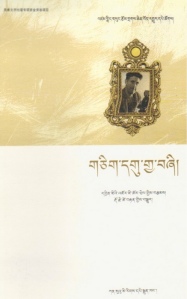 Nineteen Eighty-four in Tibetan, Lanzhou 2014
Nineteen Eighty-four in Tibetan, Lanzhou 2014
Bilingual Tibetan-English edition of Animal Farm, Lhasa, 2013
Animal Farm has also recently been translated into Uyghur, a Turkic language spoken in Xinjiang in the far west of China by about 10 million people. As in Tibet it’s seen as a fable for children 青少读物, and it has a splendidly lurid cover.
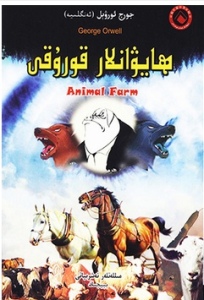 Animal Farm in Uyghur (Ethnic Publishing House, Beijing, 2014)
Animal Farm in Uyghur (Ethnic Publishing House, Beijing, 2014)
1. ORWELL AND CHINA
As I was researching Nineteen Eighty-four in Chinese (see below), I wondered whether Orwell ever wrote about China. His interest in India, where he was born in 1903, is well known, and he served in the Burma Police after leaving Eton and before becoming a writer, but my guess was that China didn’t concern him greatly. But when I went to the British Library to check in his massive, 20-volume Complete Works [CW] I was surprised to discover that he wrote quite a lot about China, and its fate under Japanese occupation in particular, when he was working for the BBC’s Eastern Service during World War II.
And of direct relevance to this article, it turns out that he asked his publishers to send a copy of Nineteen Eighty-four to his colleague, the literary critic William Empson in Peking, where he was teaching English literature. When he was seriously ill in a sanitorium in Gloucestershire Orwell wrote to his agent Leonard Moore: “William Empson in China has asked for a copy of 1984 [sic]. I think it might be wise to get two copies sent, one from London and one from New York. He already seems uncertain as to whether his letters are being opened, so could you ask both publishers not to enclose the usual card saying ‘Compliments of the Author’, as this might just conceivably be embarrassing to him.” Helpfully he gave Empson’s address as 11, Tung Kao Fang, Near Peking Normal University, Peiping 9, China (30 August 1949, CW, vol 20, p 162).
It so happens that a neighbour of mine was a close friend of the Empsons and a couple of years ago she introduced me to their son Jacobus, who has written a book about his parents’ unconventional marriage and his childhood in Peking. Jake tells me that not only did at least one copy of Nineteen Eighty-four arrive safely in Peking, but that he remembers his parents reading it so eagerly that “they had to tear it in half so they could both read it at once!” (J. Empson, email to the author, 8 March 2014). Orwell had written three months earlier that “I had vague ideas of writing [to Empson], but thought it might be embarrassing for foreigners in China to get letters from outside at the moment. Hetta, Empson’s wife, is or used to be a Communist, & he himself is not particularly hostile to Communism, but I doubt whether that would do much good under a Chinese Communist régime” (letter also from Gloucestershire sanitorium, to his American publisher Robert Giroux. Orwell adds that “I have been horribly ill for the last month or so…” 19 May 1949, CW, vol 20, p 117). Orwell seems to have been somewhat bemused by the Empsons’ departure for Peking, and in another letter to Giroux, he says: “I’d like to know what he [Empson] has to say about ‘[King] Lear’. He has disappeared into China the way people do…” (14 April 1949, CW, vol 20, p 84). Jake says Orwell’s assessment of his parents’ political stances is quite accurate. “My mother was a member of the Communist Party from 1937 until 1956, so Orwell was quite correct in her case – my father’s political opinions were more nuanced, as they say these days, but he could have been rightly described as a sympathiser – wearing his Chinese communist uniform when attending a conference in the U.S. in about 1950, for instance.”
But despite Orwell’s suspicions about the Empsons, he did not include them in his famous (or infamous) list of alleged communists that he drew up for the Information Research Department, a branch of the British Foreign Office, in 1949, shortly before he died. William’s politics were in fact sufficiently nuanced for him to accept a knighthood in 1979, five years before he died. Empson was a highly influential literary critic who taught in Peking and Kunming in the late 1930s and returned to teach at Peking Normal University from 1947 to 1952, witnessing the last years of the Chinese civil war and the Communist takeover. Orwell’s main interest in China was related to its attempts to resist the Japanese, who had first invaded the northeast in 1931 and the rest of the country six years later, and he voiced his anger in several BBC scripts. He was appalled at the eye-witness stories of extreme Japanese cruelty that came to his attention at the BBC. With unusual insight, he dated the beginning of World War II not to the German invasion of Poland in 1939 but to the Japanese invasion of China. “[The war] started, properly speaking, in 1931 when the Japanese invaded Manchuria, and the League of Nations failed to take action. From then onwards, we have seen a long series of aggressions … [I]t was inevitable that Soviet Russia, however anxious to remain at peace, should sooner or later be drawn into the war on the side of the democracies. It was inevitable that Britain and China should ultimately find themselves fighting on the same side, whatever differences there may have been between them in the past …”
Predictably enough, Orwell does not seem to have been sympathetic to the Communists, and gives the Nationalists the credit for China’s success in resisting the Japanese. He notes that when the Japanese invaded Manchuria in 1931, “China was in a state of chaos, and the young Chinese republic was in no condition to resist. Six years later, however, when the invasion of China proper began, order had been restored under the leadership of Marshal Chiang Kai-shek, and a powerful national spirit had grown up.” Orwell adds that the main reason the Chinese kept on fighting against enormous odds is that “they are fighting for their liberty, and the will to surrender does not exist in them” (16 May 1942, CW, vol 13, p 324). He also noted that “This is [Japan’s] third war of aggression in 50 years. On each occasion they have wrenched away a piece of Chinese territory and then exploited it for the benefit of two or three wealthy families who rule Japan, with absolutely no regard for the native inhabitants (17 January 1942, CW, vol 13, p 127).
It was surely Japanese cruelty towards the Chinese that angered Orwell the most. “By almost universal agreement it is a regime of naked robbery with all the horrors of massacre, torture and rape on top of that. The same will happen, or has already happened, to all the lands unfortunate enough to fall under Japanese rule. Perhaps the best answer to the propaganda which the Japanese put out in India and other places is simply three words LOOK AT CHINA” (13 March 1943, CW, vol 15, p 28). In Nineteen Eighty-four Orwell envisaged a world divided into Eurasia, Eastasia and Oceania which are continually at war against each other, and shortly after the end of World War Two he envisaged how “More and more obviously the surface of the earth is being parcelled off into three great empires, each self-contained and cut off from contact with the outer world, and each ruled, under one disguise or another, by a self-selected oligarchy.” “The haggling as to where the frontiers are to be drawn is still going on, and will continue for some years, and the third of the three super-States – East Asia, dominated by China – is still potential rather than actual,” Orwell declared. “But the general drift is unmistakable,” he said, adding rather puzzlingly that “every scientific discovery of recent years has accelerated it” (‘You and the Atom Bomb,’ Tribune, 19 Oct 1945, CW, vol 17, p 320).
This seems to be the closest that Orwell got to directly linking current politics to the horrific world of his final novel. Orwell is famous for his interest in political language, and this includes the use of appropriate words for various ethnicities, not a matter that troubled many writers of his time but one which concerned him a great deal and which he returned to again and again. In 1943 he wrote to Penguin Books with the corrected proofs of the forthcoming Penguin edition of his first novel, Burmese Days. Apart from correcting a few misprints, “I have also made a few minor alterations,” Orwell says, adding that “I draw attention to these as it is important that they should not be missed. Throughout, whenever it says in the text, ie. not in the dialogue, I have altered ‘Chinaman’ to ‘Chinese’. I have also in most cases substituted ‘Burmese’ or ‘Oriental for ‘native’, or have put ‘native’ in quotes. In the dialogue, of course, I have left these words just as they stand. When the book was written a dozen years ago ‘native’ and ‘Chinaman’ were not considered offensive, but nearly all Orientals now object to these terms, and one does not want to hurt anyone’s feelings.” (21 November 1943, CW, vol 15, p 338).
Of course “Oriental” is now almost – or just as – objectionable as “Chinaman”, and the words “racist” or “racism” would be bound to crop up in any modern discussion of such terms, but Orwell was surely ahead of his time in his sensitivity to such issues. In present-day discourse it is hard (though not impossible) to think of a more derogatory word than “Negro”, but in Orwell’s time it was a word of respect, and he insisted (more than once) that it should be written with a capital N: in a review of a special supplement to New Republic magazine, entitled The Negro: His Future in America he highlighted how “the facts it reveals about the present treatment of Negroes in the U.S.A. are bad enough in all conscience. In spite of the quite obvious necessities of war, Negroes are still being pushed out of skilled jobs, segregated and insulted in the Army, assaulted by white policemen and discriminated against by white magistrates…. “In Asiatic eyes the European class struggle is a sham. The Socialist movement has never gained a real foothold in Asia or Africa, or even among the American Negroes: it is everywhere side-tracked by nationalism and race-hatred…
“The word ‘native,’ which makes any Asiatic boil with rage, and which has been dropped even by British officials in India these ten years past, is flung about all over the place. “Negro” is habitually printed with a small n, a thing most Negroes resent.”
He adds how he has been substituting “Chinese” for “Chinaman” in Burmese Days, adding: “The book was written less than a dozen years ago, but in the intervening time ‘Chinaman’ has become a deadly insult. Even ‘Mahomedan’ is now being resented: one should say ‘Moslem.’ These things are childish, but then nationalism is childish. And after all we ourselves do not actually like being called ‘Limeys’ or ‘Britishers.'” (CW, vol 16. pp 23-24). Orwell returned to this theme in 1947, devoting an entire As I Please column to it. It has an added poignancy because the reason he was looking at a child’s illustrated alphabet is no doubt because he was by now a widower with a small adopted son, Richard. It’s a forceful piece without a wasted word, and I think it’s worth quoting in full:
Recently I was looking through a child’s illustrated alphabet, published this year. It is what is called a “travel alphabet.” Here are the rhymes accompanying three of the letters, J, N and U:
J for the Junk which the Chinaman finds
Is useful for carrying goods of all kinds.
N for the Native from Africa’s land.
He looks very fierce with his spear in his hand.
U for the Union Jacks Pam and John carry
While out for a hike with their nice Uncle Harry.
The “native” in the picture is a Zulu dressed only in some bracelets and a fragment of leopard skin. As for the Junk, the detail of the picture is very small, but the “Chinamen” portrayed in it appear to be wearing pigtails.
Perhaps there is not much to object to in the presence of the Union Jack. This is an age of competing nationalisms, and who shall blame us if we flourish our own emblems along with all the rest? But is it really necessary, in 1947, to teach children to use expressions like “native” and “Chinaman”?
The last-named word has been regarded as offensive by the Chinese for at least a dozen years. As for “native,” it was being officially discountenanced even in India as long as twenty years ago.
It is no use answering that it is childish for an Indian or an African to feel insulted when he is called a “native.” We all have these feelings in one form or another. If a Chinese wants to be called a Chinese and not a Chinaman, if a Scotsman objects to be called a Scotchman, or if a Negro demands his capital N, it is only the most ordinary politeness to do what is asked of one.
The sad thing about this alphabet-book is that the writer obviously has no intention of insulting the “lower” races. He is merely not quite aware that they are human beings like ourselves. A “native” is a comic black man with very few clothes on; a “Chinaman” wears a pigtail and travels in a junk – which is about as true as saying that an Englishman wears a top hat and travels in a hansom cab.
This unconsciously patronising attitude is learned in childhood and then, as here, passed onto a new generation of children. And sometimes it pops up in quite enlightened people, with disconcerting results; as for instance at the end of 1941, when China officially became our Ally, and at the first important anniversary the B.B.C. celebrated the occasion by flying the Chinese flag over Broadcasting House, and flying it upside-down (27 Feb 1947, Daily Herald for Tribune, CW, vol 19, pp 50-51).
I think this piece very much speaks for itself, and would only add that the phrase “competing nationalisms” has a decidedly contemporary ring about it. As this article is about partly about translation (see below), I would also like to add Orwell’s touching words that he added to a list of translations of his works (he lists no translation into Chinese but does mention editions of Animal Farm in Japanese and Korean, produced by the U.K. Liaison Mission, Tokyo and the U.S. Army, respectively). He added as a note: “Some of the above translations, chiefly of ANIMAL FARM, were not paid for. I most particularly do not wish payment to be demanded for translation of any book, article, etc., by any groups of refugees, students, working-class organisation, etc., not in any case where translation will only be made if the rights are given free. Ditto with reprints in English (I don’t think Braille versions are ever paid for, but in any case I don’t want payment for any that may be made).”
Incidentally, Orwell was by no means the first person to object strongly to the word Chinaman. The American missionary Arthur H. Smith was equally vehement in condemning the word some 50 years before Orwell. “It is a matter of surprise, and even more of regret, that this barbarous compound seems to have rooted itself in the English language, to the exclusion of the proper word Chinese. We do not know of a foreign periodical in China, in which natives of that country are not constantly called ‘Chinamen,’ nor of a single writer in the Empire who consistently avoids the use of the term.” (Smith, Arthur H. Chinese Characteristics. Enlarged and revised edition. New York: Fleming H. Revell Company, 1894. Print. Page 10, footnote).
2. THE PUBLICATION OF NINETEEN EIGHTY-FOUR IN CHINA
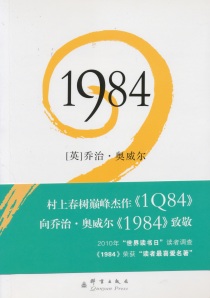 The 2010 translation of Nineteen Eighty-four with banner advertising Haruki Murakami’s 1Q84
The 2010 translation of Nineteen Eighty-four with banner advertising Haruki Murakami’s 1Q84
George Orwell’s 乔治・奥威尔 Nineteen Eighty-four is just the kind of book that you would expect to be banned in China – all that talk of Big Brother, Newspeak and the rewriting of history is far too close to the bone, surely. So I was amazed to come across it on open sale in a state-run bookshop, in Yanji 延吉 on the North Korean border in fact. Nineteen Eighty-four is all over the place in China, it turns out. A Chinese website lists no fewer than 13 translations published in the PRC between 1985 and 2012, and it’s easy to find at least three or four downloadable or online translations on a quick internet search. Apart from anything else I’m speechless at the amount of reduplicated effort all these translations involve, and also wonder how much “borrowing” has taken place between the various translations. And in addition to all the Mainland translations, about 10 have been published in Taiwan or Hong Kong, according to a University of Hong Kong M. Phil. thesis. (There is some overlap between the two categories as some translations first published in Taiwan have since been reprinted in the PRC).
I’m not sure why the Chinese government takes such a relaxed attitude to a book that condemns totalitarianism in such ferocious terms, or why there are so many different translations. It’s certainly quite unlike the Soviet Union, where the novel was strictly banned and was only available in illicit samizdat form. And the squalid, Dickensian atmosphere of Nineteen Eighty-four doesn’t remotely evoke the glitzy skyscrapers of 21st century Beijing or Shanghai, but it is remarkable that the authorities are so nonchalant about a book that is supposed to frighten the wits out dictators everywhere. Perhaps it’s the fact that the book is by a foreigner and is set explicitly in London that makes the Chinese Communist Party feel that it can brush it off so casually. Orwell’s other masterpiece, Animal Farm, translated literally as 动物庄园 or 动物农场, is also widely available in China, which is equally surprising. This Chinese Wikipedia entry says the first Chinese translation of Animal Farm was published by the leftist Commercial Press 商务印书馆 in 1948 and lists seven subsequent translations. But it’s hard to imagine an original Chinese dystopian novel or political allegory being remotely tolerated and I’m sure that any Chinese who attempted to publish such a work would soon find him or herself in serious trouble. Nevertheless, Orwell has quite a following among Chinese intellectuals (the British-based Orwell Society has at least one Chinese member), and his essays as well as his novels are widely read and discussed.
The high esteem in which Orwell is held by Chinese intellectuals is highlighted by the fact that he features in the pantheon of Western writers and thinkers on the walls of the All Sages bookstore in the university district of Beijing. Orwell’s portrait is up there with such luminaries as Albert Camus, Franz Kafka and Virginia Woolf, and the shop is well stocked with his works: I counted half a dozen different editions of Nineteen Eighty-four and Animal Farm, as well as collections of his essays, diaries and other works.
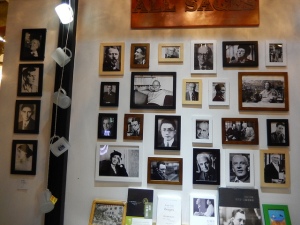 Orwell’s portrait along with Camus, Kafka, Woolf, etc at All Sages Bookstore, Beijing
Orwell’s portrait along with Camus, Kafka, Woolf, etc at All Sages Bookstore, Beijing
Orwell’s works for sale at All Sages bookstore, including Nineteen Eighty-four, Animal Farm, Down and Out in Paris and London
One reason Orwell is officially tolerated in China may well be that the Party regards making his works readily available is a worthwhile way of currying favour with intellectuals. After all, Orwell wasn’t Chinese and his best known works make no direct mention of China, so it’s possible to maintain the pretence that his writings have little relevance to China (and as noted above, his little known writings about China are highly pro-Chinese and scathing about Japanese imperialism, which suits the current regime extremely well). A further reason may be that, as Peter Hessler notes in a fascinating New Yorker article (March 9, 2015) on publishing and censorship in China, “newspapers and magazines are censored much more heavily than books,” which would give novels like Nineteen Eighty-four and Animal Farm a certain amount of leeway. But that is far from the main explanation as there are vast numbers of articles on Orwell on the internet, and there are even plenty on the website of the Central Compilation & Translation Bureau 中共中央编译局 which is under the direct control of the Communist Party. A search under 奥威尔 (Orwell) in April 2015 reveals Orwell mentioned in articles with such titles as “A transparent hallucination”, (it also mentions a range of luminaries from Zamyatin to Jeremy Bentham to Julian Assange), “The clash between western economics and harmonious civilisation” and “Culture and multiculturalism.” Which goes to show that the Party isn’t totally terrified of intellectual debate, so long as it’s at a pretty rarefied level.
The first, and probably the best known, of the many Chinese translations of Nineteen Eighty-four published on the Mainland is by Dong Leshan 董乐山 (1924-99), who, like Orwell, was an independent-minded socialist and who like almost all Chinese intellectuals suffered badly during the Cultural Revolution. Dong, whose translation was first published in 1979, wrote a remarkably frank introduction to the novel which is downloadable here in an edition published by the Liaoning Educational Publishing House in 1998. Surprisingly, this introduction remains in print, in an edition first published in 2013 combining Nineteen Eighty-four with Animal Farm (the latter translated by Gao Yuan 高 源). In the introduction Dong declares: “Orwell is not a so-called anti-communist writer in the general meaning of the phrase, and Nineteen Eighty-four is not simply a so-called anti-Soviet work….Orwell was first and foremost a socialist, and next he was anti-totalitarian and his struggle against totalitarianism is the inevitable result of his belief in socialism. He believed that only if totalitarianism is defeated can socialism be victorious.”
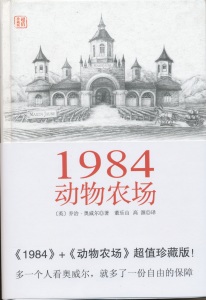 Combined edition of Nineteen Eighty-four and Animal Farm with Dong’s 1998 introduction (Shanghai, East China Normal University Press, 2013. Purchased Shanghai, 2015). The cover design seems to be based on a stock graphic with no relevance to either novel.
Combined edition of Nineteen Eighty-four and Animal Farm with Dong’s 1998 introduction (Shanghai, East China Normal University Press, 2013. Purchased Shanghai, 2015). The cover design seems to be based on a stock graphic with no relevance to either novel.
Dong’s condemnation of the Chinese Communist Party’s brutality and authoritarianism is implicit but clear enough, and becomes more direct when he praises Orwell for not being like those Western intellectuals in the 1930s who “paid homage to the ‘new Mecca’ [Stalin’s Soviet Union] and were led by the nose through ‘Potemkin villages’ and when they returned raved how they had seen the bright sunshine of a new world.” (Dong was too astute to mention the Western leftists who praised Mao’s China in the 1960s and 70s in similar awestruck terms). But Dong saved his most daring critique for last, concluding with the words: “The twentieth century will soon be over, but political terror lives on and this is why Nineteen Eighty-four remains valid today. In any case so far as we are concerned, only if we thoroughly negate the totalitarian terror associated with the ‘Cultural Revolution’ can those people who fought for socialism for so many years bring about true socialism which is worth aspiring to”. Although the Cultural Revolution is now officially regarded as one of Mao’s greatest mistakes, open discussion of the period remains highly sensitive, and Dong was extremely brave to make a direct parallel between it and the terrifying world of Nineteen Eighty-four.
It’s widely claimed that Dong’s translation of Nineteen Eighty-four was first published one year after the eponymous year, in 1985, but that isn’t correct. David Goodman of the University of Sydney has kindly provided me with a copy of the first edition of Dong’s translation, including an introduction and editor’s note, which was published in neibu 內部 (internal/restricted) form in 1979. This would have been available only to senior officials and intellectuals deemed politically reliable enough to be permitted access to such material. It was published in three installments in the “irregularly published” periodical Selected Translations from Foreign Literature 国外作品选译 and is marked on the back “Internal publication. Look after carefully” 内部刊物 注意保存. The first installment appeared in issue no 4 of the journal on April 15, 1979, with further installments in May and July.
Dong says in his short introduction to the 1979 edition (full translation below) that Nineteen Eighty-four “soon became a classic anti-communist work which was highly influential, so that anyone who takes just a casual interest in modern international politics can encounter this book almost anywhere.” Orwell is a “bourgeois intellectual” who fought on the Republican side in the Spanish civil war, while the novel is “the embodiment in print of how he imagined the future of society based on contemporary Soviet society, in which he exaggerates and caricatures phenomena which do not fit in with his bourgeois individualist liberalism.” Dong also notes how expressions such as “Big Brother” and “doublethink” have entered the English language, “which shows how great its influence is.” The (anonymous) editor’s note makes a similar point, noting that the phrase “‘Orwellian society’ is a frequently used English expression”, and says “Western newspapers and magazines even directly or indirectly refer to this book as an anti-communist ‘classic'”. It says Orwell “changed from being a ‘left-wing’ to an extreme right-wing writer”, and adds: “The way the book exaggerates and distorts all aspects of this future society under totalitarian rule is used to incite anti-Soviet and anti-communist feelings in the service of the Cold War and ideological war that was then waging.”
 Above: First, neibu edition of Nineteen Eighty-four in Chinese, 1979 in Selected Translations from Foreign Literature, issues 4-6.
Above: First, neibu edition of Nineteen Eighty-four in Chinese, 1979 in Selected Translations from Foreign Literature, issues 4-6.
Interspersed with Nineteen Eighty-four in the first edition are extracts from an eclectic selection of other works: The Final Diagnosis by Arthur Hailey (author of Airport and Hotel), a critique of The Third World War by Sir John Hackett, The Japanese by Edwin O. Reischauer, a biography of Franklin D. Roosevelt by Alden R. Hatch, Roots by Alex Haley and a memoir by the Japanese writer Yasushi Inoue 井上 靖. At the back of issue no 4 are details of the first three issues, which include extracts from the memoirs of Stalin’s daughter, Svetlana Alliluyeva, stories by the British science fiction writer John Wyndham and yet more by and about Arthur Hailey. It also includes an advertisement for another presumably neibu publication, Foreign Thought 国外思潮, which features articles by the prominent Soviet dissidents Aleksandr Solzhenitsyn and Andrei Sakharov as well as works by “French right-wing bourgeois thinker” Raymond Aron, “extreme ‘rightist’, former chairman of the French-Chinese Friendship Association” Charles Bettelheim, and a critique of “the main representatives of the ‘new left'”, Herbert Marcuse and Karl Popper. Both Foreign Translations and Foreign Thought are supplements to the journal Editing and Translation Reference “遍译参考” 增刊. I have uploaded the advertisement here.
It may seem surprising that publication of a book by an anti-communist “extreme right-winger” like Orwell was permitted in China, even in a neibu edition, but as can be seen from the above paragraph the authorities have taken a relatively pragmatic approach, and heretical works, including books by Trotsky and Bakunin, were in the 1970s and since made available to top officials, and were often labelled 反面教材 (negative teaching materials). (See here for a discussion of this in Chinese). I recall seeing the best-selling novel Jonathan Livingston Seagull as well as Gone with the Wind in neibu editions when I was a student at Fudan University, Shanghai in 1975-76, and I believe other Western novels were also published at this time as “negative teaching materials”.
There is an interesting account here of how Dong’s translation of Nineteen Eighty-four was first published. Dong’s friend and fellow translator Wu Ningkun 巫宁坤 also recalls Dong and his efforts to translate Nineteen Eighty-four. Dong joined the underground Communist Party in Shanghai in 1940, but like most intellectuals he was persecuted and imprisoned during the 1957 Anti-rightist campaign and during the Cultural Revolution. He was allowed to return to Beijing after injuring himself on a tractor, and this is when he came across The Rise and Fall of the Third Reich 第三帝国的兴亡 by William Shirer. According to Wu he saw close parallels between the Nazi period in Germany and the Cultural Revolution. He secretly translated at night Shirer’s eye-witness account of Nazi Germany which after the Cultural Revolution was published as a neibu publication for senior officials and was later published openly. He first encountered Nineteen Eighty-four in the early 1970s when he had found himself a job in Beijing at Xinhua news agency 新华社 where he had worked in the 1950s. He came to the notice of the deputy director of the agency, Chen Shiwu 陈适五, who was editing a periodical with the snappy title Selected Translations from Foreign Literature 国外作品选译. Chen seems to have been an independent-minded official for he told Dong he was looking for “material which has reference value and is quite long and is unconventional in character, for leaders and other comrades to refer to.” (Material which is considered too unsound to be read by the masses is often known as “reference material” in official Chinese jargon). Dong decided that Nineteen Eighty-four was the ideal candidate, and as mentioned above it was published in installment form in 1979. Only 5,000 copies of the periodical were printed. The novel was first issued in book form in China in Guangzhou in 1985, again as a neibu publication. This was the idea of Cai Nüliang 蔡女良, an editor at Huacheng Publishing House 花城出版社, who had it published in a set together with Brave New World and We. It was republished openly by Huacheng three years later. It is worth noting that although Wu quotes from Dong’s introduction in which he states how Nineteen Eighty-four remains valid today, for clearly political reasons he omits the reference to the Cultural Revolution.
Fu Weici holding a copy of his translation of Animal Farm (David Goodman)
Another translator, Fu Weici 傅惟慈 (1923-2014), recalled in a moving tribute to Dong how his friend was in the 1970s reluctant at first to propose that Nineteen Eighty-four be translated into Chinese because of the all too clear parallels with recent Chinese history including the Cultural Revolution, and much later, in 1997, he had trouble getting a two-volume selection of Orwell’s writings published. There seems to have been no problem with the first volume, which was a collection of essays and criticism, but the second volume was to have consisted of Nineteen Eighty-four and Animal Farm, the latter translated by Fu. At the time Fu wrote the memoir, his translation of Animal Farm had still not been published, although it has since appeared, both alone and in combination with Nineteen Eighty-four. Incidentally Fu notes that Dong’s later translations include Tinker, Tailor, Soldier, Spy 锅匠、裁缝、士兵、间谍 by John Le Carré, The Last Temptation of Christ 基督的最后诱惑 by Nikos Kazantzakis (co-translated with Fu, this was particularly controversial apparently, though Fu doesn’t give details) and Darkness at Noon 正午的黑暗 by Arthur Koestler.
The first ever Chinese translation of Nineteen Eighty-four appeared in Taiwan in 1950, according to Walter Tsang Ka Fa’s 曾家輝 master’s thesis, A study of three Chinese translations of George Orwell’s Nineteen Eighty-four (2005), which is based mainly on translations by Qiu Suhui 邱素惠 (Taipei, 1975), Joseph S.M. Lau (Liu Shaoming) 劉紹銘 (Taipei, 1984) and Dong Leshan (Guangzhou, 1985). Lau is perhaps the best known of the translators in the west, and is co-editor of Classical Chinese Literature: An Anthology of Translations (New York, 2000) and author of Hong Kong Remembered (Hong Kong, 2002). Most of the translations listed by Tsang have been published in several different editions. In fact, he lists no fewer than 16 different translations, although he says Qiu’s translation is “grossly abridged”, which has not stopped it from being published in 15 different editions, and this does not include recent Mainland reprints. Tsang compares how different translators translate particular passages (including the famous slogan “Big Brother is watching you”) and says “there is no noticeable distinction between the translations that that may be attributable to political considerations.”
Incidentally, it’s not unusual for Western books in China to be published in many different translations: for example, a Chinese website lists no fewer than 35 translations of Walden by Henry David Thoreau published between 1978 and 2015.
Regarding Dong’s Mainland translation, Tsang says that “It seems the political environment at the time of translating the novel does not bother Dong at all. This is because he resolutely declares in his preface to the translation that he abhors totalitarianism and would like to warn readers – presumably readers in China in particular as it was first released by a Guangzhou publisher – of such horror with Orwell’s novel” (pp 125-6). Tsang doesn’t consider the possible influence of censorship on the various translations, and one should bear in mind that Taiwan in the 1950s and 60s was almost as authoritarian as the PRC.
Sadly, another translator of Nineteen Eighty-four, Animal Farm and Coming Up For Air , Sun Zhongxu 孙仲旭 , committed suicide in August 2014 at the age of 41, having suffered from depression. He also translated Catcher in the Rye by J.D. Salinger among many other works of 20th century British and American fiction. There’s a huge amount of material about Orwell on the internet and in print in Chinese, far too much to go into in any detail here. Most of his major works have been translated, as have two biographies, Orwell: The Life by D.J. Taylor (2004) and Orwell: Wintry Conscience of a Generation by Jeffrey Meyers (2000), in a translation by Sun Zhongxu. There is also what appears to be an original Chinese biography of Orwell, but as it’s subtitled “The Cold [or Stern] Conscience” 冷峻的良心, I can’t help wondering if it’s not heavily based on Meyers’ work. The author of the Chinese biography is Ya Shalong
Here’s my translation of Dong’s introduction to the 1979 edition of Nineteen Eighty-four and of an editor’s note on the novel:
On the book and its author
George Orwell (1903-1950) was the pen name of the British author Eric Blair. He was a bourgeois intellectual who fought on the Republican side in the Spanish civil war. He later wrote some novels and essays but they did not receive much attention [at the time] and he died of tuberculosis when he was middle aged, so his two political allegories Nineteen Eighty-four (published in 1949) and Animal Farm (published in 1945) only became well known after his death.
Nineteen Eighty-four, together with We by A. Zamyatin and Brave New World by A. Huxley are together known as the “dystopian trilogy”. This is in contrast to the “utopian trilogy” which appeared at the time of the emergence of capitalism, consisting of Utopia by Thomas More, The City of the Sun [La città del Sole] by [Tommaso] Campanella and Christopolis by [Johann Valentin] Andreae. The earlier “utopian trilogy” represents the search for mankind’s glorious prospects set in a future ideal society and reflects an imaginary yet optimistic yearning, while the “dystopian trilogy” is in fact the precise opposite and shows how the bourgeoisie and intellectuals cannot see a future path for mankind or a way of resolving present society’s contradictions, and thus are representative works for feelings of pessimism and hopelessness. But while Huxley’s Brave New World (published in 1932) describes how industrial western capitalist society strangled individual freedom and as it develops the future consists of the advanced development of material conditions and the extreme erosion of spiritual culture, Orwell’s Nineteen Eighty-four is the embodiment in print of how he imagined the future of society based on contemporary Soviet society, in which he exaggerates and distorts phenomena which do not fit in with his bourgeois individualist liberalism. The future described in all three of these books consists of a society which has been totally bureaucratised, and mankind has lost [all] freedom and individuality and has been totally transformed into automatic machinery. Orwell’s Nineteen Eighty-four in particular, in order to suit the demands of the cold war that was then taking place, soon became a classic anti-communist work which was highly influential, so that anyone who takes just a casual interest in modern international politics can encounter this book almost anywhere. “Big Brother”, “doublethink”, etc have become part of modern English vocabulary, which shows how influential it has become. Editor’s note [in Selections from Foreign Literature, issue 5, p. 100]: George Orwell’s Nineteen Eighty-four was published in 1949, but the book’s influence in the western world has not faded over the last 20 or more years. Western newspapers and magazines continue to directly or indirectly regard this book as a anti-communist “classic”, and often quote it as a “classic” in envisioning a pessimistic view of future society. “Orwellian society” is an often used English expression. The author of the book George Orwell is the pseudonym of the modern British author Eric A. Blair (1903-1950). He changed from being a “left-wing” to an extreme right-wing writer. Nineteen Eighty-four is a satirical fantasy novel in which he used contemporary Soviet society as a model for future society as he imagined it. The book totally exaggerates and distorts every aspect of this future society under totalitarian government in order to incite anti-Soviet and anti-communist feelings in the service of the war of words that was being waged during the cold war at that time. In order understand ourselves and others, this magazine is publishing the full text, starting from the previous issue.
And here’s my translation of the foreword to the 2010 edition, published by Qunyan Press 群言出版社 in Beijing. The translation (and presumably the foreword) are by Fu Qiang 富强, which is a pseudonym meaning “rich and strong”. I have uploaded the Chinese original here.
Foreword
George Orwell (1903-1950) was a British novelist. Among world novels there are the so-called “dystopian trilogy, consisting of We 我们 by the Soviet Union’s Zamyatin, Brave New World 美丽新世界 by Britain’s Huxley and the present work by Orwell, 1984.
To put it briefly, this book is a political satire. The plot is strange, grotesque, but it seems to obey certain rules of social development. The novel describes the evil development of totalitarianism which has developed to an appalling degree – human nature has been strangled, freedom has been eradicated, thought has been suppressed and life has become extremely monotonous.
Just like this book, the book that made Orwell famous, Animal Farm, is a very accurate – but similarly biased – novel. All the characters are animals, and the plot is strange and original, with a strong comic element, and to this extent it is pervaded by fear. But Nineteen Eighty-four is entirely lacking in comedy and a bone-chilling sense of fear fills the entire work.
The fear isn’t gory and physical however but reflects a hopeless feeling that human nature has been extinguished. For example, the novel describes an official language called Newspeak 新语言 whose use is compulsory and whose purpose is to reduce the number of words in the language to the smallest possible number so that people will not be able to think except in terms of concepts that the state has decided. Furthermore, no Party member can avoided being officially monitored and there is an electronic screen in every room that cannot be turned off, and the screen accurately transmits each sound [that it hears] to the “Thought Police”.
Nineteen Eighty-four is Orwell’s [most] enduring work. Not only do readers love it but it is deeply respected by scholars. Some of the words and phrases invented in the book, such as Big Brother 老大哥,Doublethink 双重思想, Newspeak and Thought Police 思想警察, are listed in authoritative English dictionaries and are even in world circulation. Everybody acknowledges that Nineteen Eighty-four is an extremely graphic description of totalitarianism, and is also an extremely fierce retort 反抗 to totalitarianism. The New York Times praised this book: “No other work of this generation has made us desire freedom more earnestly or loathe tyranny with such fullness.” Many people are convinced that “if one more person reads Orwell, there will be one more guarantee of freedom.”
In fact, Nineteen Eighty-four isn’t purely a political novel but is a journey that asks questions about good and evil and beauty and ugliness in human nature and about reality. But while it cares about human nature it does not turn the novel into a dry textbook or manifesto. If that’s all it was it wouldn’t have attracted so many readers from all around the world. Even though what it talks about is politics it is really about human nature. Mixing politics and human nature together so they are inseparable is Orwell’s most successful achievement.
This is a book which reveals deep truths and no matter how many times you read it you will reach a deeper understanding each time. So far as the reader is concerned, this is a challenge to his or her intelligence and is also a rare opportunity to gain wisdom.
It’s worth noting incidentally that the comments about human nature being strangled, freedom eradicated, thought suppressed and life becoming extremely monotonous seem to have been taken straight from Fu Weici.
• The copy I bought in Yanji came with a band around it advertising Haruki Murakami’s 1Q84, which had just been published in Chinese and which it says pays homage to Nineteen Eighty-four 向乔治 奥威尔 1984 致敬。
• Incidentally – nothing to do with China or Chinese – but I don’t think it’s widely appreciated just what a tragic figure Orwell is. He died at the age of 46, his first wife, Eileen O’Shaughnessy, died on the operating table aged 39, only a few months after they had adopted a baby boy, Richard Horatio Blair, and Orwell married his second wife Sonia Brownell on his deathbed in University College Hospital. He died less than three months later.
• On a personal note, may I add that in the early 1960s I lived on Vicarage Road, Henley-on-Thames, where Orwell lived as a small boy with his mother and sister in 1904. Oh, and I regularly visit the Royal Free Hospital in Hampstead, opposite which is a cafe with a plaque that notes that it was once a bookshop in which Orwell worked in the early 1930s. The report in the Telegraph assumes the portrait that formed part of the plaque was stolen, but a members-only posting (since deleted unfortunately) on the Orwell Society‘s website suggested that the damage was the result of bad weather rather than vandalism. I’m glad to report that it was repaired in 2014. It’s not a raffish, writerly sort of cafe I’m afraid, but part of a well-known chain – I don’t think George would have approved. And speaking of the Royal Free, there’s a porter who works there whom I see almost every time I visit called Winston Smith.
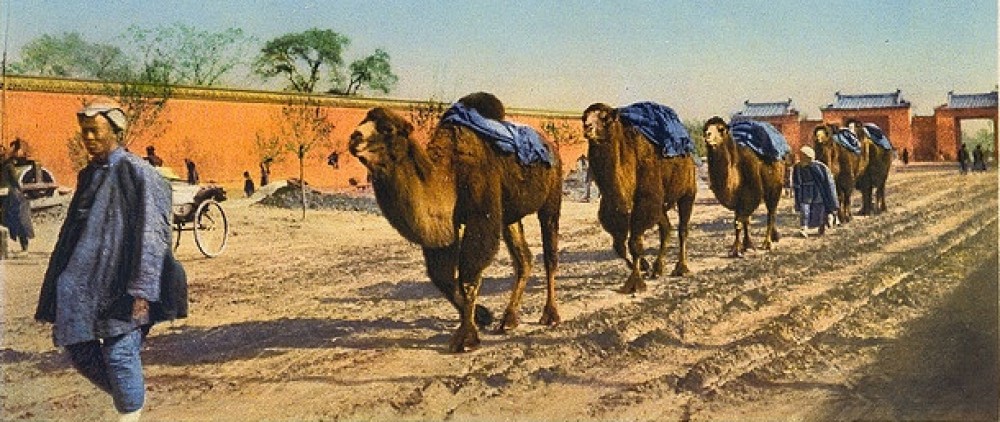
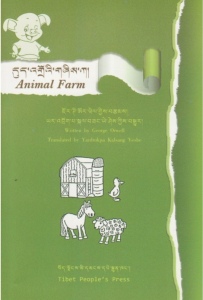
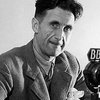
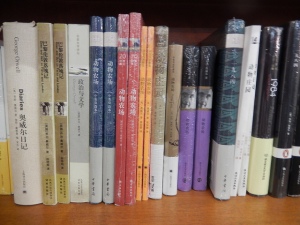
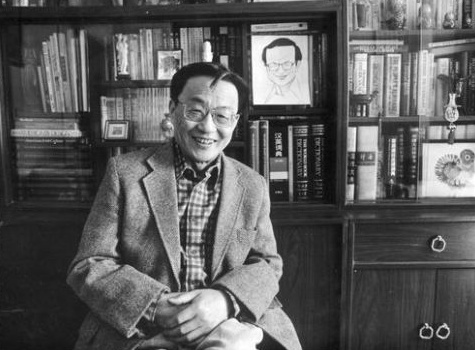 Dong Leshan
Dong Leshan